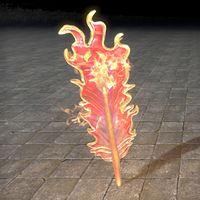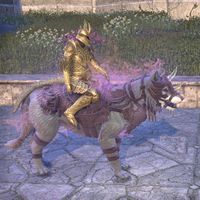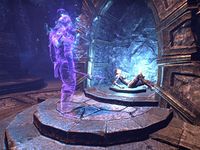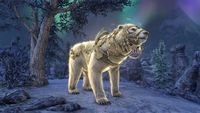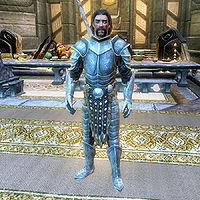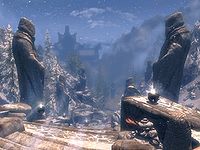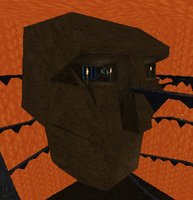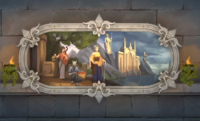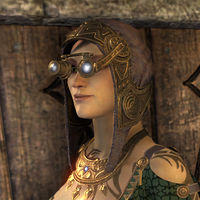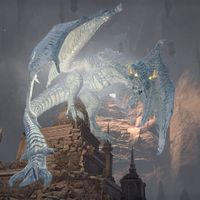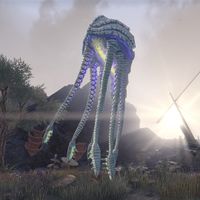Lore:Aetherius
| This page is currently being redesigned for the Lore Places Project (LPP). The page may need work to meet the standards outlined on the project page. |
| Aetherius | |
|---|---|
| Type | Realm |
| Realm | Aurbis |
| Subregions | Mantellan Crux Sovngarde Far Shores Sands Behind the Stars |
| Appears in | Daggerfall, Skyrim, ESO |
Aetherius (known also as the Immortal Plane,[1] the Aether,[2] and Heaven)[3][4] is a plane of the Aurbis thought to be the origin of all magic and arcane arts.[5][6][7] The stars and the sun are thought to be holes into Aetherius left by spirits (notably Magnus) who long ago became dissatisfied with Mundus.[5] It is a common belief that the soul of a dead person, assuming they are not Nirn-bound for some reason, goes to Aetherius, to continue on as a spirit,[8] where it is said many souls of mortals become spirits of another sort.[1] Materials known as Aetherial Fragments often become dislodged and fall to Nirn; these are commonly observed by the people of Tamriel as 'shooting stars'.[5]
Aetherius, much like Oblivion, consists of a multitude of realms which serve different purposes and is described as a bright sea containing many worlds "of everlasting imperfection", and as a place of "searing light" that contrasts the darkness of Oblivion.[4][9][10] It is described as an infinite place, or a deep, dark, and endless sea, beyond the past and the present and the known world, where time is irrelevant and from where the gods originated.[11][1][12] The realms of Aetherius are said to move, to "dance and sway". It is said that in primordial times Y'ffre sang to Aetherius, weaving songs so beautiful that the Stars|stars were compelled to dance and sway, continuing to wink and blink afterward in memory of that song as the realms of Aetherius which those stars are windows to likewise dance and sway to Y'ffre's music.[1] For Nords, their chosen place in Aetherius is Sovngarde, the Hall of Valor.[13] The Redguards have a different place in Aetherius, called the Far Shores,[7] as do the Khajiit, a realm known as the Sands Behind the Stars.[14] These locations are not necessarily exclusive to those particular races, but may depend on an individual's beliefs, choices during their lifetime and the manner of their death, including the possibility of servitude to the Daedra in Oblivion.[15][16][17] For instance, in 2E 582 King Emeric of Wayrest was (temporarily) killed in the Chamber of Passage in the Hall of Heroes; his soul was drawn through a nearby passage to the Far Shores, despite his being a Breton.[18] Being worlds of the dead, certain realms of Aetherius like Sovngarde have been described as places where the living shouldn't linger.[19]
The Aedra are said to have originated in Aetherius,[20][11] and are described as "Aetherius-aligned et'Ada",[UOL 1] having come into existence at the Beginning Place alongside some of the Daedric Princes.[7][15] After Convention, the Aedra, as well as varieties of uncontacted, minor Aedric spirits, are said to reside in Aetherius once again. Though minor Aedric spirits exist, they are rarely encountered since Magnus withdrew from the world at the moment of creation. This is said to be because interfering with Mundus is generally considered to be off-limits since the end of the ages of myth and, as a result, they tend to no longer respond to mortals directly[21][22][23][24] The Luminaries, immortal beings of pure magic are generally thought to bear some relation to Aetherius. They have been theorized to be fallen tears of Aetherius formed of its energy manifested in physical form, new lifeforms that arose naturally from the meeting of life and aetherial energy, "children" or creations of the Aedra that were sent as their proxies to guide mortals and are to Aetherius what the Daedra are to Oblivion, aetheric constructs born from the imprinting of the subconscious eidolons of mortals upon purest magicka, a natural part of the cycle of magic that functions as the mechanism by which it is emanated to the mortal world akin to a lamp casting light or an aqueduct carrying water, or ascended ancestor spirits, the souls of dead mortals that have taken on a new form.[25][26][27]
The Magna Ge, who fled Mundus before Convention and created the stars, reside here.[UOL 2][UOL 3] The Mantellan Crux is a self-contained plane that for a time was the resting place of the Mantella after it was blasted into Aetherius by Zurin Arctus.
Powerful curses can sometimes cause part of Aetherius to overlay with Nirn, drawing spirits from that realm back into the world of the living.[28]
According to the Order of the Ancestor Moth, mortal souls are the Aedric essence at the core of every mortal's existence.[12] Souls have also been described as the piece of every mortal which comes from Aetherius, the realm of pure light and magic, and a "tiny star" which flares into a "sun" when magic is invoked.[29]
Contents
Travel[edit]
Travel to Aetherius[edit]
There are certain groups that managed to create vessels for Aetherial travel. During the Merethic Era, a mythical order of Aldmeri explorers known as the Sun Birds of Alinor were said to have pierced the veil between Mundus and Aetherius using the raw magic of the Ehlnofey.[30] Their expeditions to Aetherius are said to be among the most famous attempts in history, however some scholars believe that actual proof of a successful journey is non-existent.[30] Another example is the Imperial Mananauts of the Reman Dynasty, who undertook comporable expeditions to the Sun Birds,[4] during which they discovered and named the Slipstream Realms.[31] The Dwemer were rumored to have used vessels called "Aetherbells", that could "dive" through the realms of Aetherius and Oblivion.[32]
Some portals to Aetherius can be found on Nirn, the Chamber of Passage in the Hall of Heroes is one such gate leading to the Far Shores,[33] and the gate to Sovngarde in the ancient fane of Skuldafn is another.[34]
Travel to Aetherius is possible through magic, the renowned mystic Nulfaga could transport others to the realm,[35] and certain life-force devouring wraiths can transport the living to Aetherius in order for the dead to drain their essence.[36]
Certain magical beasts that walk Nirn are said to be able to help spirits that linger in the mortal world reach Aetherius. Gathering up the souls of those who died violently, or couldn't move on from heartbreak, despair or other such causes and providing them with sanctuary until they are ready to be ushered into the afterlife.[37] Spirits caught on the precipice between life and death might also have powerful wraiths sent after them to take them to Aetherius by force.[38][39]
Travel from Aetherius[edit]
The spirits of the dead that reside in the afterlife are able to travel to other planes, being able to manifest both in realms of Oblivion or in the world of the living, Nirn, for a variety of reasons. Spirits have returned to the affairs of the living to take vengeance on those who've wronged them,[40], to bestow blessings to those who've aided them before departing again,[41] to act on the behalf of a deity that they serve as emissaries,[42][43] to give their approval for great deeds,[44][45][46] or to impose trials on their living descendants. Some sources claim that all waterways are portals between the world of the living and the world of the dead, from which ancestor spirits can observe and cross into Nirn.[47][48][49][50]
During times of need in the mortal world, Aetherial planes such as Sovngarde might send the spirits of dead heroes back to the living world to provide aid, occasions on which those spirits are said to ride the spirits of beasts whose souls likewise reside in that plane. Spirit beasts have also been known to return individually in order to act as companion mounts to courageous living champions, or to serve as the eyes and ears of the afterlife within the living world.[37][51] Certain Shouts such as the Call of Valor are said to function by issuing a call for aid to Aetherial spirits, who respond to the call and "journey beyond time and space" to give their aid.[52] There exist magical runes which can call a spirit back into the living world from Aetherius, Archmage Shalidor placed such runes on his tomb to call his soul back to Nirn during times when magic in Tamriel was under threat.[53]
Aetherial Influence[edit]
There are cases where aetherial influence can affect the mortal world without planar travel taking place. The spirits of the dead are said to be able to exert influence over the living world, being able to grant great fortune or misfortune or commune through and alter the dreams of the living.[48][50] There have been cases of Aetherius-bound spirits reaching out to the living via altering their dreams and subsequently using said dreams as a medium to alter time in a form of ultimately fatal curse. The living target of the curse would initially experience strange dreams relating to the ghost's past, eventually realizing that they were being made to travel to different eras of history in their sleep when the people in the dream noticed the intruding presence and reacted to it, resulting in them being immediately moved to a different time upon being seen, and thus revealing the intent behind the magic. The experience would repeat nightly until burns started appearing on the dreamer's body, culminating in them magically burning to ash.[54] Some sources claim that exerting influence upon the living world in such a manner is easier for spirits which are well-honored by the living, as that reverence strengthens them.[48]
Upon death, some of the accumulated experiences of mortal existence which the soul is vessel for, the Fjyrons, the "will to peace", or memories of the dead,[55] dissipate into the living world. This essence retains a connection to both the grand fabric of creation and to all aspects of the soul in all their destinations. Thus, because all aspects of a soul remain connected, tapping into the Fjyrons allows one who knows how to receive the erudition of the ancestors. Knowledge and guidance from beyond mortality, from the existence beyond the present and the past and the known world, where time is irrelevant, allowing one to glimpse the cosmic tapestry and its threads and representing a connection to the Aedra and the "endless Aedric coil of mortal souls" through the experiences of every mortal who has ever lived. Because of this some groups such as the Cult of the Ancestor Moth make use of this connection to receive the wisdom of the ancestral spirits in the afterlife, using it to read and interpret the Elder Scrolls.[12][56] This rite can be dangerous, as it is suggested to cause "aetherial residue" to build up in the body, which needs to be cleansed lest it deaden the body parts it is in contact with.[57][58]
The sun is said to represent the connection between Aetherius and the Mundus, and to be the conduit through which the influence of certain Aedra such as Auri-El reaches the mortal world.[59][60]
Gallery[edit]
Sovngarde, a Realm of Aetherius (Skyrim)
The Far Shores, a Realm of Aetherius (ESO)
A Varla Stone, a type of Aetherial Fragment (Skyrim)
References[edit]
- ^ a b c d Girnalin's dialogue in ESO
- ^ From Nirn to the Aether — Icarian
- ^ Artorius Ponticus Answers Your Questions — Bishop Artorius Ponticus
- ^ a b c Pocket Guide to the Empire, 3rd Edition: Arena Supermundus: The Tapestry of Heaven — Imperial Geographical Society, 3E 432
- ^ a b c Magic from the Sky — Irlav Jarol
- ^ Mysticism — Tetronius Lor
- ^ a b c The Monomyth
- ^ The Talos Mistake — Leonora Venatus
- ^ Sithis
- ^ Connalenwe's dialogue in ESO
- ^ a b pg.237 of Lord of Souls — Greg Keyes
- ^ a b c The Distributed Soul — Abbot Crassius Viria
- ^ Sovngarde, a Reexamination — Bereditte Jastal
- ^ Trail and Tide — Moon-Bishop Hunal
- ^ a b The Abbot Crassius Viria Answers Your Questions — Abbot Crassius Viria
- ^ The Doors of Oblivion — Seif-ij Hidja
- ^ Tamrielic Lore — Yagrum Bagarn
- ^ Events of ESO
- ^ Tsun's dialogue in Skyrim
- ^ Elder Scrolls Online - Knowledge Base
- ^ Pocket Guide to the Empire, 3rd Edition: All the Eras of Man, A Comprehensive History of our History — Imperial Geographical Society, 3E 432
- ^ Serana's dialogue in Skyrim: Dawnguard
- ^ Phrastus of Elinhir Answers Your Questions — Phrastus of Elinhir
- ^ Glorious Upheaval — Thendaramur Death-Blossom
- ^ The Crow's dialogue in ESO
- ^ Loremaster's Archive - Scribing — Votary Nahila
- ^ Ulfsild's Notes: The Origin of Luminaries — Ulfsild
- ^ Andewen, Meldil and Quaronaldil Duure's dialogue in ESO
- ^ pg. 52 Lord of Souls — Greg Keyes
- ^ a b Prismatic Sunbird Feather antiquity codex entry in ESO
- ^ Lord Fa-Nuit-Hen and Tutor Riparius Answer Your Questions — Fa-Nuit-Hen and Tutor Riparius
- ^ Dwemer Star Chart antiquity codex entry in ESO
- ^ To Walk on Far Shores quest in ESO
- ^ Sovngarde quest in Skyrim
- ^ Journey to Aetherius quest in Daggerfall
- ^ Soul Thirsters and Baleful Ghosts in ESO
- ^ a b Sovngarde Crate's descriptions in ESO
- ^ The Netch'dialogue in ESO
- ^ Inevitable End in ESO
- ^ Ancestor Spirit and Orcthane Berserker's appearance in Heart's Grief in ESO
- ^ Ulfgar the Unending's dialogue in Morrowind
- ^ The Emissary of Z'en's appearance and dialogue in ESO
- ^ Mathragor's dialogue in ESO
- ^ Ysgramor's dialogue in ESO
- ^ Yngol's dialogue in ESO
- ^ Ylgar's dialogue in ESO
- ^ Domitia Nasica's dialogue in ESO
- ^ a b c Clever Kail-Perwa and the Great Boast — Nalae-Polek, Poet Laureate to Potentate Versidue-Shaie
- ^ Proconsul Beloren-Kaie's appearance in ESO
- ^ a b The Proving Festival — Laije-Palak Rulician
- ^ Sovngarde Sabre Cat Cub's description in ESO
- ^ Call of Valor's description in Skyrim
- ^ Shalidor's dialogue in ESO
- ^ Solitude: A Charred Journal — Ysogar
- ^ Ancestor-Silk Shawl item description in ESO
- ^ Pension of the Ancestor Moth
- ^ Moth Priest's Cleansing Bowl codex entry in ESO
- ^ Loremaster's Archive - Elder Scrolls & Moth Priests — Sister Chana Nirine
- ^ Vyrthur's dialogue in Skyrim
- ^ Serana's dialogue in Skyrim
Note: The following references are considered to be unofficial sources. They are included to round off this article and may not be authoritative or conclusive.

